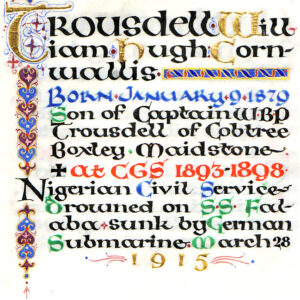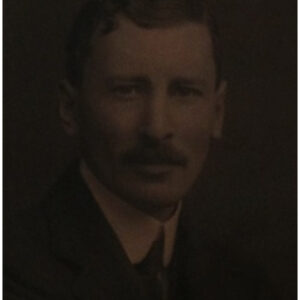He was appointed a clerk in the colonial audit department in June 11 1904. The following year he received an overseas posting, and assumed his duties as assistant auditor at Calabar on July 7 1905, making a journey up the Cross river in November and December. From January to July 1906 he was based at Bonny and sailed for England on his first leave aboard the S.S. ‘Sekondi’ on July 13. Hugh arrived at Bonny for his second tour of duty on January 3, 1907. He returned to Lagos as acting local auditor on February 17 1908, and was transferred to the treasury as a financial assistant 2nd Grade on July 26 1908, promoted to 1st Grade January 1 1910. Prior to the amalgamation of Northern and Southern Nigeria on January 1 1914, Hugh was appointed chief accountant of the combined Railway Department. His photographs are contained in the Janus Collection.
His obituary read as follows; ”
WILLIAM HUGH CORNWALLIS TROUSDELL
1879 – 1915
OBITUARY
It is with deep regret that we have to announce the death, at the age of 36, of William Hugh Cornwallis Trousdell, which took place on Palm Sunday. He was returning to Northern Nigeria, on board the S.S. Falaba, when that vessel was torpedoed by a German submarine off the coast of Pembrokeshire.
Hugh Trousdell was the eldest son of Mr. W.B.P. and Mrs Trousdell of Maryland in this parish, and grandson of the late Mr. and Mrs. Whatman of Vinters.
He was born January 9th, 1879 and at the age of 9 obtained a Randall Scholarship at the Maidstone Grammar School, Mr. Crosthwaite then being Head Master. Later he went to Mostyn House, Park Gate, Cheshire and finally he rejoined Mr. Crosthwaite at Carlisle, Mr Crosthwaite having left Maidstone and being Head Master at the School at Carlisle.
From Carlisle he went to Queen’s College Oxford having obtained a Hastings Exhibition. While at Oxford the South African War broke out and he at once joined the University Volunteers and went with them to South Africa. On the close of the War he returned to Oxford and took his degree. Hugh Trousdell was for the last eleven years in the Colonial Civil Service in Northern Nigeria and was chief accountant of the Nigerian Railways, to which office he was returning when he went on the Falaba. He was a member there of the Nigerian Volunteeers[1]
It was my privilege to have known Hugh Trousdell, and to have met others who knew him far better than I did, and our unanimous opinion of him is that he was a Christian, an Englishman and a Gentleman, the three most honourable positions, higher than these you may not hope on earth to go.
As a Christian he realised that the Catholic faith, the watchword of christendom, had broken down the barriers between nations and families, had brought before the world the idea of universal right and of absolute justice. As an Englishman he realised that he was of that race who have known best how to mingle obedience with liberty, how to conquer with valour, to rule with justice and to spare in mercy.
As a Gentleman he realised that he had received by inheritance the highest cultivation of a Christian English nature; which surely means cultivation of the powers of the mind, training of the powers of the heart, curbing of violence of temper and the careful nurture of the body.
I cannot conclude without offering to the members of the Trousdell and Whatman families, and to his fiancée, Miss Sybil Thesiger, the deepest sympathy from all who live in Boxley, Grove Green and Weavering Street.
A Memorial Service was held in Boxley Church on Wednesday, April 7th, which was well attended by many parishioners as well as by relatives and friends. Portions of the Burial Service were read and the lessons for All Saints’ Day. Psalm XC. and the hymns “Lead, kindly Light,” “Brief life is here our portion,” and“Christ will gather in His own,” were sung. The service was very impressive. In the evening a half-muffled peal was rung on the church bells.
James R. Hale.
[1] Actually The Southern Nigerian Regiment into which he was “gazetted” (in the Southern Nigeria “Gazette”) as a 2nd Lieutenant on 28th June 1911 by Alexander George Boyle the Acting Governor and Commander in Chief who signed his commissioning certificate on 2nd August 1911.


